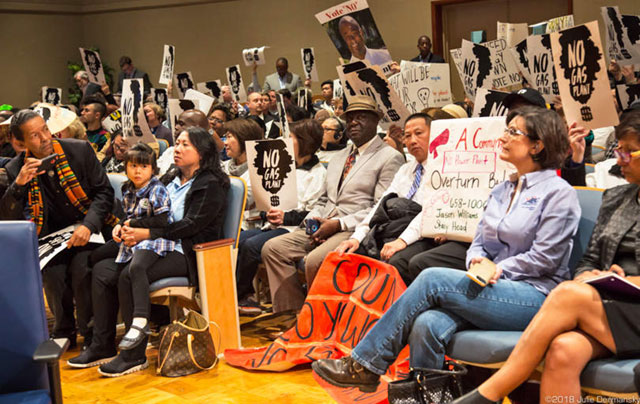
Despite hearing over four hours of public comments mostly in opposition, New Orleans City Council recently approved construction of a $210 million natural gas power plant in a predominantly minority neighborhood. Entergy is proposing to build this massive investment in fossil fuel infrastructure in a city already plagued by the effects of climate change.
Choosing a gas plant over renewable energy options flies in the face of the city’s own climate change plan and the mayor’s support for the Paris Climate Accord, said several of the plant’s opponents at the heated meeting when City Council ultimately voted to approve the plant.
“It is not enough to plan for how we will adapt to climate change. We must end our contribution to it,” wrote Mayor Mitch Landrieu in the introduction to the city’s climate action plan. Released in 2017, the plan calls for halving the city’s greenhouse gas pollution by 2030.
Members of a coalition opposing the plant, formed in 2016 after Entergy first announced its plans, expressed outrage that the council was unwilling to at least postpone its vote after hearing over four hours of public comments, many against it.
This coalition includes residents from New Orleans East, where the plant is slated for construction, community activists, and environmental justice groups.
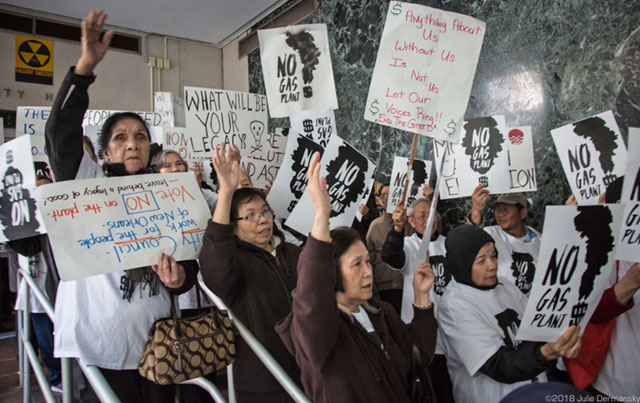 Members of the New Orleans East Vietnamese community waiting to get into the New Orleans City Council meeting on March 8.
Members of the New Orleans East Vietnamese community waiting to get into the New Orleans City Council meeting on March 8.
New Orleans regulates its own utilities, giving the City Council direct oversight of Entergy, the company that provides power to the city. The council’s Utility Commission voted to approve the project on February 21, weeks ahead of a Louisiana Department of Environmental Quality (LDEQ) hearing on March 6 which considered Entergy’s air permit application and the full City Council vote on March 8.
Before the public weighed in at the council meeting, the City Council’s energy consultants from Dentons US LLP, a Washington, DC-based utility law firm, concluded that the project was in the city’s best interest. The consultants determined that the proposed 128-megawatt plant and its seven natural gas-fired engines would ensure the city has enough power at peak energy times and avoid outages that have afflicted the city.
The plant will be built in New Orleans East, home to predominantly African-American and Vietnamese communities, an area that the Federal Emergency Management Agency has designated as a flood zone.
Among those speaking before the council vote were a few who favored the project, citing jobs and energy security as their reasons for supporting it.
As The Advocate reported: “Entergy officials, meanwhile, listened on the sidelines, rather than actively defending their proposal as they have done for months.”
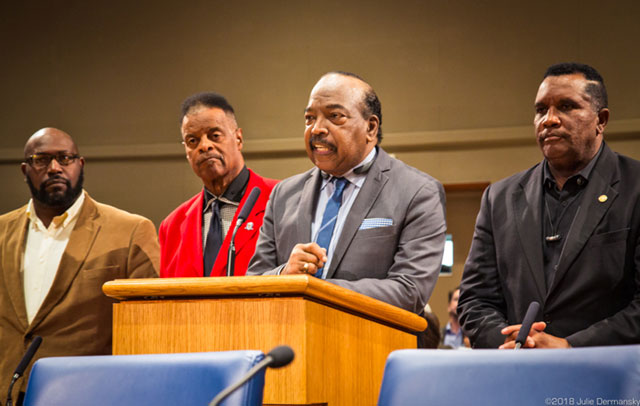 Rev. Willy Gabriel, pastor of West Baptist Church, speaking in support of Entergy’s gas power plant surrounded by others who support the plant.
Rev. Willy Gabriel, pastor of West Baptist Church, speaking in support of Entergy’s gas power plant surrounded by others who support the plant.
Other concerns raised about the plant centered on environmental racism for siting yet another industrial project in a community of color and its potentially harmful effects on the environment and public health.
Happy Johnson, author and humanitarian, rebuked the council’s Utility Commission for pushing for a vote before the LDEQ’s hearing. “A vote in favor of a gas plant proposal before an air quality hearing is like getting on a boat with holes in it [or] flying a plane without a pilot,” Johnson said. “It does not give people in the community faith at all. It is an irresponsible government practice.”
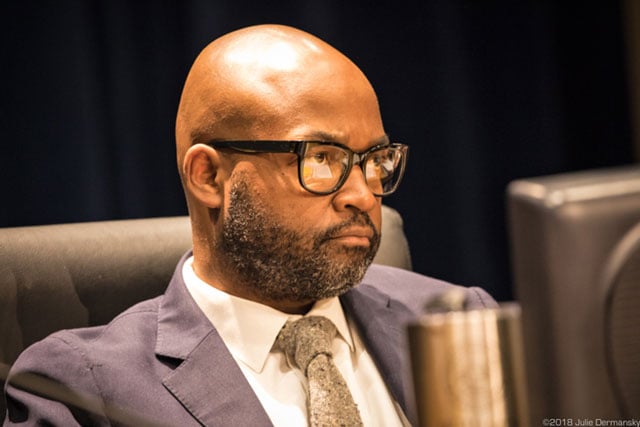 Councilmember-at-Large Jason Rogers Williams, who at times was confrontational with speakers during the New Orleans City Council meeting on March 8.
Councilmember-at-Large Jason Rogers Williams, who at times was confrontational with speakers during the New Orleans City Council meeting on March 8.
By the time the council voted 6-1 in favor of the project, only its opponents appeared to remain in the room.
Afterward, council members offered explanations for refusing to delay the vote and for their support of the project, trying to justify their actions to the crowd.
Councilmember Susan Guidry was the lone “no” vote. She said she voted against the plant because not only will it contribute to climate change, she doesn’t believe it will solve New Orleans’ energy outage issues. “The cost of the plant will be on your bills for the next 30 years,” Guidry said. “The plant’s technology would likely be obsolete before you finish paying for it.”
While Guidry agreed with the consultants’ finding, which said “Entergy has a critical and urgent reliability issue that needs to be addressed,” she doesn’t believe allowing the company to build a new gas plant will address that issue. Instead she stressed the need to fix the deteriorating transmission and distribution system that has caused thousands of power outages.
Forest Bradley-Wright with the Alliance for Affordable Energy and several other speakers at the meeting concurred. As he explained in an editorial in The Advocate: “Issues with our transmission and distribution problems, not lack of power, caused 100 percent of the outages we experienced. Entergy’s proposed plant would not have prevented any of them.”
While the rest of the council had misgivings about the plant and expressed disappointment that Entergy failed to propose more than one option, as instructed, the six who voted for it accepted the consultants’ conclusion that the plant would be in the city’s best interest.
Mayor-elect and current councilmember LaToya Cantrell said she feels that the city needed to do something now, and though she didn’t like that Entergy did not propose other solutions, the council needed to take it, claiming that a “yes” vote was their only responsible option.
Fracking, the Elephant in the Room
Josh Fox, Oscar-nominated filmmaker of Gasland, weighed in at the meeting. He warned the council about the impacts the hydraulic fracturing (fracking) industry has already had on the climate and environment. Supporting new natural gas infrastructure projects over renewable energy runs counter to the Democratic platform, he told them. Most natural gas produced in the US today is extracted via fracking.
Though the Obama administration claimed that natural gas was a “bridge fuel” to cleaner energy sources, scientists since have linked rising natural gas production in North America to the increase in global methane emissions, a potent greenhouse gas.
In March 2017, a study by researchers at Purdue University and the Environmental Defense Fund found that natural gas power plants put out between 20 and 120 times more methane pollution than previously believed, due in part to accidental leaks and deliberate “venting.” And as far back as 2011, researchers from Cornell University warned that switching from coal to gas could be a grave mistake for the climate.
Environmental Racism
Residents of New Orleans East, a predominantly African-American and Vietnamese neighborhood, are no strangers to what they say is clear environmental racism.
During Hurricane Katrina, their community was one of the hardest hit in the city, and among the last to recover.
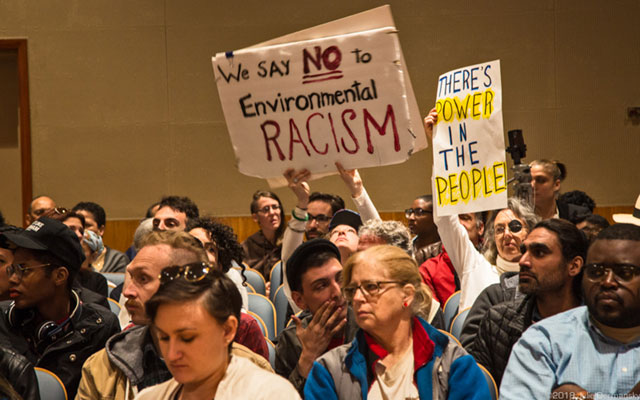 Opponents of Entergy’s natural gas plant at the New Orleans City Council meeting.
Opponents of Entergy’s natural gas plant at the New Orleans City Council meeting.
Many Vietnamese residents, whose distrust of the city’s interpreter prompted the community to choose its own, brought up the council’s decision after Hurricane Katrina to place a hurricane debris landfill near the Village de l’Est community. They say that project brought with it toxic fumes and health risks and that a new toxic project was not welcome.
Elders in the community worry about impacts the plant would have on their children’s health. Cam Tran lifted Christina Tran, age 5, up to the podium so she could have her say. “Please protect us from harm,” the child said.
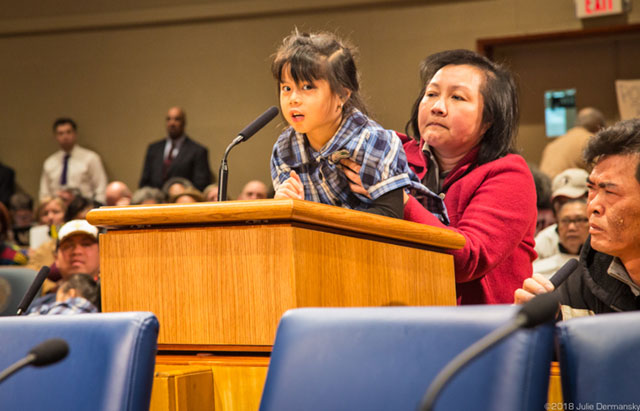 Christina Tran addresses the New Orleans City Council before the vote on Entergy’s gas plant.
Christina Tran addresses the New Orleans City Council before the vote on Entergy’s gas plant.
Larry J. Morgan, an 85-year-old African-American retiree, told the council that if they allow the plant to be built they would be responsible for the deaths of unborn babies, alluding to studies raising questions about the effects of natural gas development on pregnant women and infants.
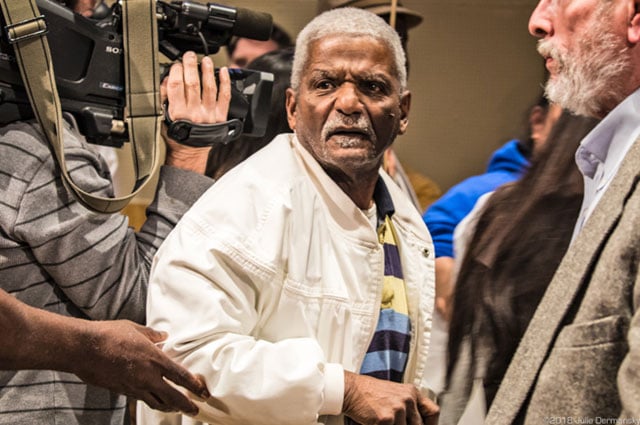 Larry J. Morgan called the New Orleans City Council “murderers” after they voted to approve Entergy’s natural gas power plant.
Larry J. Morgan called the New Orleans City Council “murderers” after they voted to approve Entergy’s natural gas power plant.
And Pearl Cantrell, a white New Orleans resident with the 600-member Kenilworth Civic Association, confronted race head on: “Please, do not put what you don’t want anywhere else in New Orleans East.”
Battle Against the Gas Plant to Continue
In the week preceding the council meeting, the coalition against the plant held numerous events aimed at stopping the project’s approval. They staged a rally at New Orleans City Hall on March 3 before boarding buses for Killona, Louisiana, in the heart of Cancer Alley. There, they held a protest march that traveled past Entergy’s Waterford 3 Nuclear Power Plant and ended at the Holy Rosary Cemetery in Hahnville, next to a Dow Chemical plant.
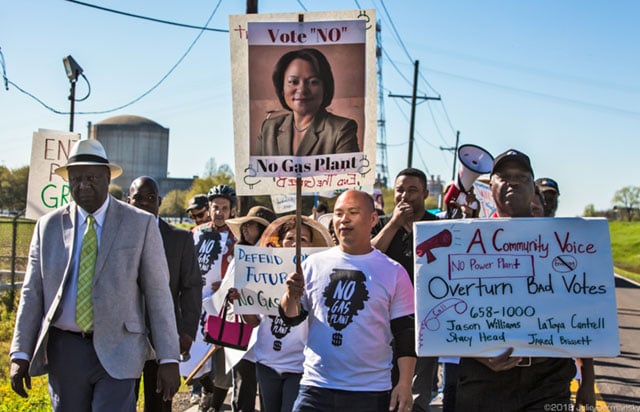 Pat Bryant (left) leading a march on River Road in the middle of Louisiana’s “Cancer Alley” against Entergy’s proposed gas plant and environmental racism. Behind the marchers is Entergy’s Waterford 3 Nuclear Power Plant.
Pat Bryant (left) leading a march on River Road in the middle of Louisiana’s “Cancer Alley” against Entergy’s proposed gas plant and environmental racism. Behind the marchers is Entergy’s Waterford 3 Nuclear Power Plant.
 Protest march in Louisiana’s “Cancer Alley” against Entergy’s proposed gas plant.
Protest march in Louisiana’s “Cancer Alley” against Entergy’s proposed gas plant.
Bryant, one of the march’s leaders, told me how Cancer Alley got its name. Roughly thirty years ago when leading a march on the same route, he helped come up with the unofficial name for the 85-mile industrial corridor stretching from Baton Rouge to New Orleans that is home to a large portion of the nation’s petrochemical production.
Since that time, state regulators, including the current head of LDEQ, Chuck Carr Brown, point to the state’s cancer registry to try to debunk the claim that Louisiana has a “Cancer Alley.” The Louisiana Tumor Registry “doesn’t show any elevated levels of cancer at all in any group of people,” Brown said at a parish council meeting in St. John the Baptist, across the Mississippi River from where the group marched.
But many assert that the tumor registry’s data don’t give an accurate picture because it uses larger population groupings, which include many people who are not living in close proximity to the corridor’s industrial plants, diluting cancer reports from those who do.
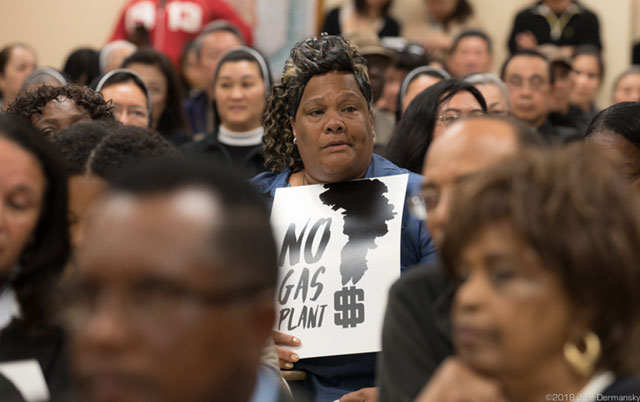 Sylvia McKenzie at the state Department of Environmental Quality air quality permit hearing for Entergy’s gas plant in New Orleans East on March 6.
Sylvia McKenzie at the state Department of Environmental Quality air quality permit hearing for Entergy’s gas plant in New Orleans East on March 6.
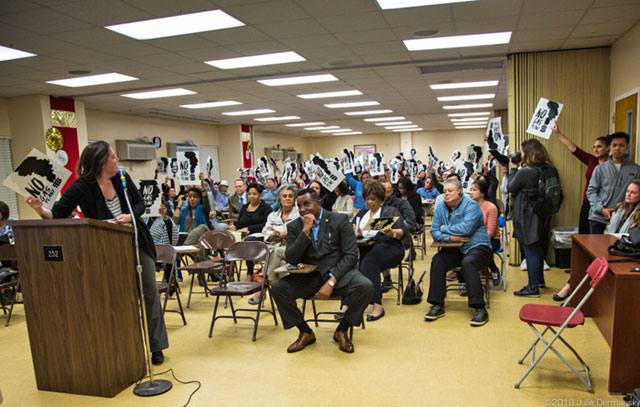 Packed house at LDEQ’s air quality permit hearing for Entergy’s gas plant in New Orleans East on March 6.
Packed house at LDEQ’s air quality permit hearing for Entergy’s gas plant in New Orleans East on March 6.
In a final push against the plant, many from the coalition arrived hours early to assure entry to the March 8 council meeting. By the time the council approved the plant, coalition members felt utterly let down, with some leaving the emotional meeting wiping away tears.
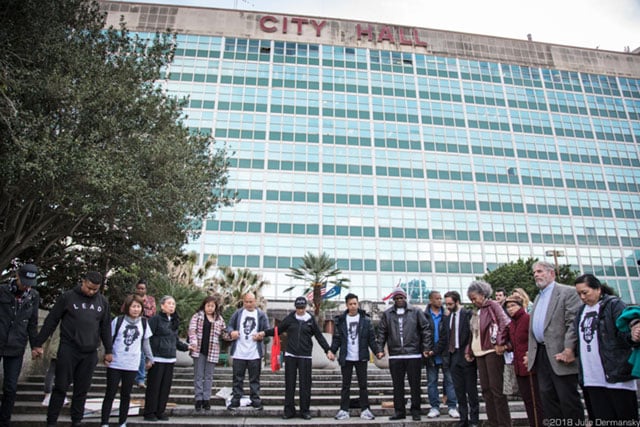 Gathering outside New Orleans City Hall after City Council voted to approve Entergy’s gas plant.
Gathering outside New Orleans City Hall after City Council voted to approve Entergy’s gas plant.
Afterward, Johnson* gathered everyone in a circle in front of City Hall, where the group prayed together and vowed to regroup and fight on.
The stakes are high. Many believe their lives, as well as the city’s future, hang in the balance.
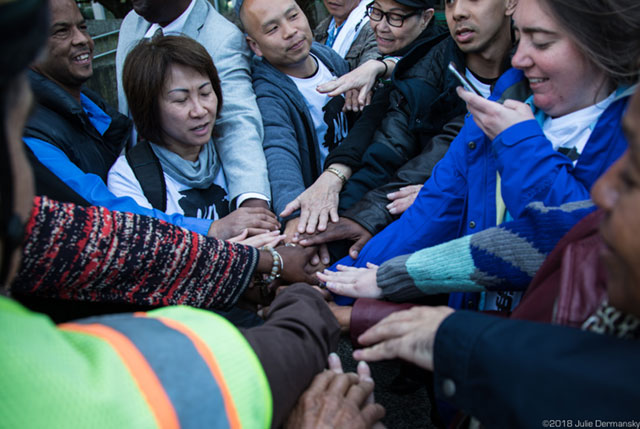 The coalition against the gas plant shows the colors of their hands, celebrating their racial diversity after the New Orleans City Council meeting March 8.
The coalition against the gas plant shows the colors of their hands, celebrating their racial diversity after the New Orleans City Council meeting March 8.
*Update 3/14/18: This story originally incorrectly identified Bryant as leading the gathering. We regret the error.
Our most important fundraising appeal of the year
December is the most critical time of year for Truthout, because our nonprofit news is funded almost entirely by individual donations from readers like you. So before you navigate away, we ask that you take just a second to support Truthout with a tax-deductible donation.
This year is a little different. We are up against a far-reaching, wide-scale attack on press freedom coming from the Trump administration. 2025 was a year of frightening censorship, news industry corporate consolidation, and worsening financial conditions for progressive nonprofits across the board.
We can only resist Trump’s agenda by cultivating a strong base of support. The right-wing mediasphere is funded comfortably by billionaire owners and venture capitalist philanthropists. At Truthout, we have you.
We’ve set an ambitious target for our year-end campaign — a goal of $250,000 to keep up our fight against authoritarianism in 2026. Please take a meaningful action in this fight: make a one-time or monthly donation to Truthout before December 31. If you have the means, please dig deep.